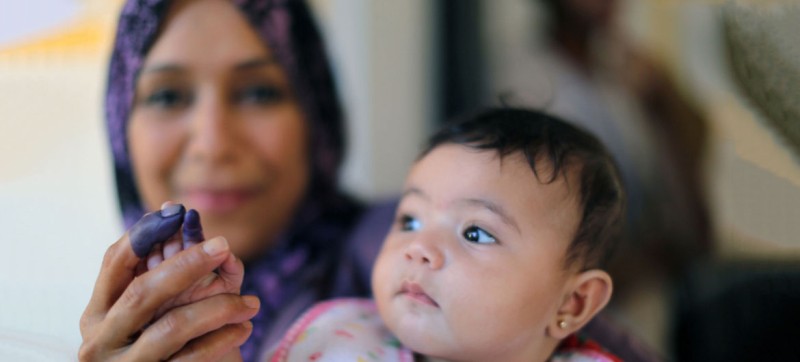UNSMIL A mother holds up her and her daughter's inked fingers at a polling station proudly displaying Libyans newfound right to vote.
Since his briefing last month, Mr. Bathily has continued working to advance the political process and revive the electoral track.
In Türkiye, Qatar, the United Arab Emirates, Egypt and Tunisia, he told ambassadors he had been seeking coordinated support for the UN Mission, UNSMIL, to help political leaders overcome their differences, and resolve the legitimacy crisis of institutions, designed to democratize the divided nation.
“I reiterated that the first important step on the path to legitimacy, security, and sustained stability is to afford the 2.8 million Libyans registered to vote the opportunity to cast their ballot and to freely select their country’s future leaders to open a new era for Libya, its neighbours and the region”, said the top UN official, who heads UNSMIL.
Tweet URL
Expressing gratitude for support the UN in resuming intra-Libyan dialogue, he informed the ambassadors of plans to hold talks with other international partners over the coming weeks.
Put Libya first
Mr. Bathily has urged the House of Representatives (HoR) and the High Council of State (HSC), to “rise above personal and group interests” to work towards finalizing the constitutional basis for elections, within a well-defined timeframe, and in line with the aspirations of the Libyan people.
He is working with the HoR and HSC chairs to convene a meeting on Libyan soil to signal a fresh round of political talks, which would “demonstrate to all Libyans their willingness…to find a way out of the crisis”.
He said he was also in touch with the Presidential Council, to facilitate a meeting between the three institutions to set “a positive example” towards “healing the wounds of division”.
“I have also highlighted my readiness to work with all actors to reach consensus on a Libyan-owned and Libyan-led political process”, that can extricate the factio-riven nation from over 10 years of political turmoil, “and increasing economic and social hardship for the majority of its population”, continued Mr. Bathily, imploring Council members to support UNSMIL in the reconciliation process.
Disturbing developments
On the eve of the one-year anniversary since UN-backed December elections were postponed, the UN envoy reminded that the protracted crisis significantly impacts Libyans’ wellbeing, compromises national security, and “threatens their very existence.”
“It also carries a serious risk of further dividing the country and its institutions”, he said, pointing to signs of partition with two parallel governments, separate security apparatuses, a divided central bank, and growing discontent over the unequal allocation of the huge revenues of oil and gas of the country.
Meeting for progress
In contrast to their political counterparts, the 5+5 Joint Military Commission (JMC) – featuring representatives from the UN-recognized Government and main opposition forces – has demonstrated a stronger will to implement the ceasefire agreement and unify the country’s security institutions, according to Mr. Bathily.
Despite a reported build-up of forces on both sides, the ceasefire continues to hold, albeit amidst nationwide tension.
Serious security hurdles
A robust civil society is fundamental for a safe, open, and democratic discourse – UN envoy
Meanwhile, the proliferation of weapons under the control of various State and non-State actors along with foreign fighters and mercenaries continue to pose serious challenges to the safety of Libyans and undermine efforts to unify security institutions.
“This year alone, 39 people have been killed and maimed in Explosive Remnants of War incidents, including 11 children. About 76 percent of those affected were civilians”, said the Special Representative.
He drew attention to “a systematic campaign” by Libyan security forces to silence civil society, humanitarian actors, human rights defenders and political activists.
“It is my conviction that a robust civil society is fundamental for a safe, open, and democratic discourse between the State and its citizens and represents the very foundation required for Libya’s political transition”, he stated.
Turning to the economy, he reiterated the urgency of establishing a Libyan-led mechanism with country-wide representation to agree on spending priorities and ensure that oil and gas revenues are managed in a transparent and equitable manner.
He asked the Council to apply pressure on Libya’s political leaders to finalize the path to a new constitution, warning that the people’s patience “is not limitless” and their suffering from outdated and open-ended interim political arrangements must be alleviated.
He also pushed for creative ways to ensure free and transparent presidential and parliamentary elections under a unified, neutral administration.
“Together we must resolve to help the Libyans to mark the year 2023 the year of the beginning of a new ear through the rise of legitimate institutions through free and fair elections”, concluded the UNSMIL chief.
Click here to see the meeting in its entirety.




Comments are closed.